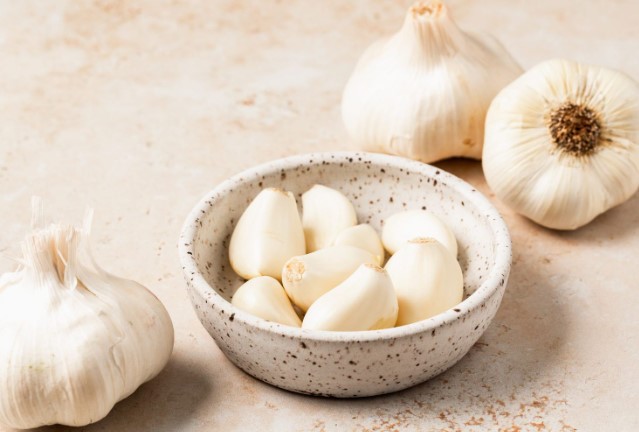Can cats eat garlic? What to do if your cat eats garlic?
Can cats eat garlic? Garlic is a popular ingredient in many human dishes, but it can be toxic to cats. Cats’ bodies cannot process the sulfur compounds found in garlic, which can lead to serious health problems. If you’re a cat owner, it’s important to know the dangers of garlic and to avoid feeding it to your feline friend. In this article, we’ll discuss the risks of garlic toxicity in cats and provide tips for keeping your pet safe. Follow Cat Memorial Stones !!
Can cats eat garlic? Can cats eat garlic powder?
Why is garlic toxic to cats? Garlic belongs to the Allium family, which also includes onions, leeks, chives, and shallots. These plants contain compounds known as thiosulfates, which are highly toxic to cats. Thiosulfates can cause oxidative damage to red blood cells, leading to a condition called hemolytic anemia. In severe cases, this can be life-threatening if not treated promptly.
While garlic is considered more toxic to cats than onions, both should be strictly avoided. Even garlic powder or cooked garlic can be harmful, as the toxic compounds are not diminished by processing.

How Much Garlic is Toxic to Cats? How much garlic powder is toxic to cats?
Cats are highly sensitive to garlic, and even a small amount can be harmful. According to veterinary experts, consuming as little as 5 grams of garlic per kilogram of a cat’s body weight can result in toxicity. This is roughly equivalent to a single clove of garlic for an average-sized cat.
Because garlic toxicity can accumulate over time, even occasional ingestion of small amounts can eventually lead to serious health issues.
Symptoms of Garlic Poisoning in Cats
If your cat has ingested garlic, it’s crucial to watch for symptoms of garlic toxicity. These symptoms may not appear immediately and can take several hours or days to develop, depending on the amount consumed. Common symptoms of garlic poisoning include:
- Lethargy: A cat may become unusually tired or weak.
- Vomiting and diarrhea: Gastrointestinal distress is a common sign.
- Loss of appetite: Your cat may refuse to eat.
- Pale gums: This can be a sign of anemia, indicating a lack of red blood cells.
- Rapid breathing or difficulty breathing: Oxygen deficiency due to anemia can cause respiratory issues.
- Increased heart rate: Anemic cats may have an elevated heart rate as their body struggles to transport oxygen.
- Yellowing of the skin and eyes (jaundice): This indicates severe liver damage in extreme cases.
If you notice any of these symptoms, immediate veterinary attention is essential.
>>> Read: Can Cats Eat Hamburger?
How long after eating garlic will a cat get sick?
It can take 2-4 days for a cat to show symptoms of garlic poisoning.
Garlic is toxic to cats due to a substance called allicin, which damages red blood cells. If you suspect your cat has eaten garlic, it’s important to contact your veterinarian immediately. Early intervention can improve the chances of a successful recovery.

What to Do if Your Cat Eats Garlic
If you suspect your cat has ingested garlic, take action immediately. Here are the steps to follow:
- Contact a Veterinarian: Reach out to your vet or an emergency pet poison hotline. Time is crucial, and professional guidance is necessary.
- Induce vomiting (only if instructed): Do not attempt to induce vomiting unless specifically advised by a vet, as improper handling can cause more harm.
- Monitor your cat closely: Even if symptoms aren’t immediately evident, continue observing your cat for any unusual behavior or signs of distress.
Prevention Tips: Keep Garlic Out of Reach
- Secure your kitchen: Keep garlic, along with other toxic foods like onions and chocolate, stored away where your cat cannot access them.
- Check food labels: Many processed foods, including baby food and certain pet foods, may contain garlic powder. Always check ingredient lists before offering any food to your cat.
- Educate family and visitors: Make sure everyone in the household is aware of the dangers of garlic for cats and avoids feeding it to them, even accidentally.
Conclusion
Garlic may be a flavorful addition to your meals, but it is dangerous for your feline companions. Ingesting garlic can lead to a range of severe health issues, including hemolytic anemia, gastrointestinal distress, and even death in extreme cases. Always be cautious about what your cat consumes and ensure that garlic, in any form, is kept far out of their reach.

Frequently Asked Questions (FAQs)
- Can a small amount of garlic hurt my cat? Yes, even small amounts of garlic can be harmful to cats due to the toxicity of thiosulfates.
- Is garlic powder as dangerous as fresh garlic? Yes, garlic powder contains the same toxic compounds as fresh garlic and can pose a significant risk to cats.
- What should I do if my cat eats food containing garlic? Contact your veterinarian immediately for guidance, as prompt action is crucial.
- Are onions also toxic to cats? Yes, onions, like garlic, belong to the Allium family and are toxic to cats.
- Can cats eat garlic powder? No, cats should not eat garlic powder. Garlic powder, like garlic in any form, is toxic to cats. Ingesting even a small amount can cause severe health problems, including hemolytic anemia, a condition where red blood cells are destroyed.
- Cat ate garlic bread? If your cat has eaten garlic bread, it’s important to contact your veterinarian immediately. Even a small amount can cause serious health problems.
- Cat ate garlic skin? Yes, garlic skin can be just as harmful to cats as the cloves themselves. The toxic compound n-propyl disulfide is present throughout the garlic plant, including the skin.
Protect your cat by keeping garlic out of reach and consulting your vet for any questions regarding their diet.
>>> Read: Can cats eat hummus? What Happens If a Cat Eats Hummus?
